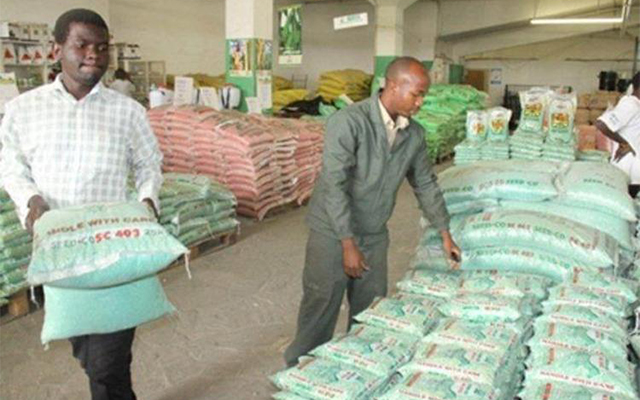Command inputs collection begins

 Herald Reporters—
Herald Reporters—
Farmers contracted to grow maize under Government’s Command Agriculture programme have started collecting inputs in most parts of the country ahead of the onset of the rainy season. Those with large consignments are collecting directly from suppliers, while those with smaller hectarage are either getting them from Grain Marketing Board depots or established collection points.
Surveys by The Herald have shown that farmers have started receiving inputs. In Matabeleland South, some districts have started distributing inputs to registered farmers, the provincial programme coordinator, Mr Judiya Ncube said yesterday. He said about 69 farmers, including those from irrigation schemes, had registered for Command Agriculture.
Read more:
- Command agric creates buzz in Kariba
- Manicaland gears for Command Agric
- Govt seeks funds for command agric
- VP Mnangagwa calls for unity on command agric
- Thumbs-up for command agric
- Boost for command agriculture
- Command agric takes course
“The inputs, which include fertiliser, fuel and seed have started arriving in batches as per our needs though I do not have the exact figures at the moment. “Insiza and Fulibasi districts have already started distributing the inputs to the beneficiaries. Our allocation will be based on the total hectarage and the number of contracted farmers,” he said.
Mr Ncube said the province had targeted a hectarage of 2 500 under the programme. In Manicaland, about 1 500 farmers with a combined 12 548ha had their contracts approved to produce maize under Command Agriculture.
A provincial summary released by the Command Agriculture taskforce yesterday revealed that 539 farmers with a cumulative 6 448 ha have been contracted to produce maize under irrigation while 889 farmers, with a total of 6 099,6ha, will grow maize under dryland.
About 24 294ha were registered under dryland and 16 033 under irrigation, which is still a far cry from the 65 000ha target set for the province. More than 25 000 farmers in the province’s natural regions one, two and three have expressed interest to produce maize under the $500m scheme with capacity to unlock the country’s potential to produce enough food to fill strategic grain reserves and surplus for export.
Manicaland this week received 90 tonnes of seed maize for farmers in Chipinge, Mutare and Makoni districts and 60 tonnes of lime in Mutare and Chipinge districts.
In Mashonaland West, provincial Agritex officer Mrs Edna Shambare said logistics on how the inputs would be distributed and accessed by farmers were still being finalised. “We are still in the process of communicating with our national command centre. In short, logistics are still being finalised,” she said.
The process involves notifying successful farmers and providing them with information on where they will get the inputs. Chinhoyi University of Technology, which is carrying out various farming projects at Hunyani Farm applied to be considered for the command agriculture programme but was yet to get a response.
“We applied but we have not yet been informed if we were successful or not. Agritex officers were supposed to visit the farm to assess its capacity to meet requirements but as of now, they have not come,” said a source at the farm.
The majority of the 150 farmers contracted under the command agriculture in Masvingo are still to receive adequate stocks of fuel, seed and fertiliser amid hopes that all the farmers would have received the required inputs within the next seven days.
About 1 307 hectares of land have so far been tilled with fuel supplied to farmers though additional fuel is required to till the 2614,97 hectares earmarked for command agriculture in the province.
Masvingo provincial agricultural extension services officer Mr Paul Poshai, who is in charge of command agriculture in the province, said only 30 tonnes of seed had been delivered with more expected in the coming week.
‘’We have so far received 30 tonnes of seed at the GMB Masvingo depot, which is one of the two receiving depots in the province together with Chiredzi district. Inputs delivered at the GMB Masvingo depot also caters for farmers in Zaka,Bikita, Gutu,Chivi and Masvingo districts while Chiredzi district also covers Mwenezi,’’ he said.
Besides seed, about 150 tonnes of lime and 60 tonnes of Compound D fertiliser were also delivered at the GMB Masvingo depot while Chiredzi depot only received about 122 tonnes of lime.
‘’Our farmers have done part of the tillage and they are now expecting seed and fertiliser and those in need of lime were also freely coming to collect. We are optimistic that in the next seven days we would have delivered most of the inputs to our farmers,’’he added.
Most of the land earmarked for command agriculture in Masvingo is coming from small-holder irrigation schemes and individual farmers domiciled in areas close to water sources where they can easily draw water for irrigation.
Of the 400 000 hectares to be put under maize production under command agriculture programme, 264 000 hectares is dry land, while 136 000 hectares is irrigable. The import substitution maize production programme targets both A1 and A2 farmers as well as Government institutional farms, particularly those near water bodies. Farmers are signing performance contracts, initially for three consecutive growing seasons, commencing with the 2016/17 summer season and will receive support covering maize seed, fertilisers and tillage.
The programme costs approximately $516 million for the initial three years, and key expenditures relate to inputs and labour, including harvesting costs, land preparation and transport expenses. The Government wants the command agriculture to cover wheat and soyabeans in future.









Comments